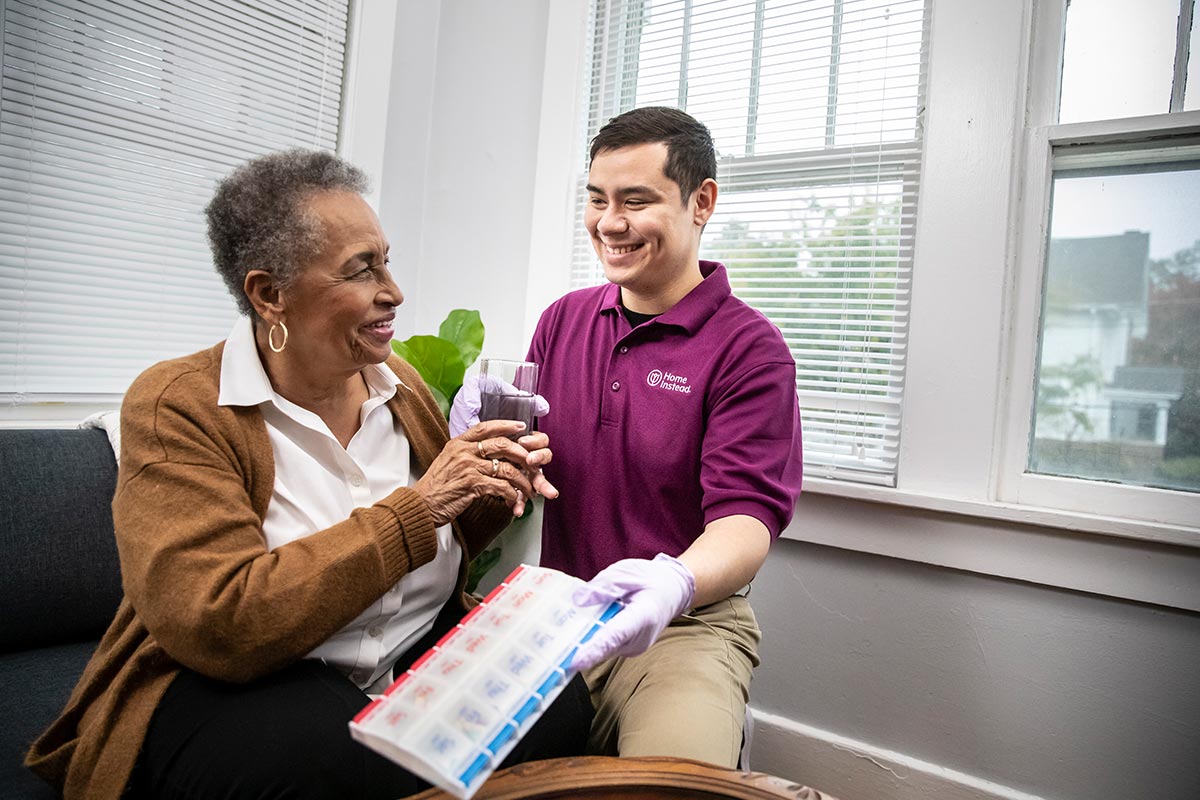Caring for a family member or friend with Alzheimer's or dementia can be a challenging and demanding experience. Families often face emotional, physical, and mental stress while trying to provide the best care possible. In-home caregivers from Home Instead of Granger, IN, offer a valuable solution that brings numerous advantages to both the families and the individuals living with Alzheimer's or dementia. This article explores the benefits of having an in-home caregiver, comparing it to other care alternatives like family-provided care and assisted living facilities.
How In-Home Caregivers Support and Transform Family Life
In this section, we will explore the various ways in-home caregivers support and transform family life, highlighting the relief they provide from caregiver burnout, the professional expertise they bring, the flexible support options available, the emotional peace of mind they offer, and how they help maintain the natural roles within the family.
- Relief from Caregiver Burnout:
- Reduced Stress Levels: Caring for a loved one with Alzheimer's or dementia is a demanding task that can lead to significant stress. In-home caregivers share the caregiving responsibilities, allowing family members to take breaks, recharge, and focus on their own well-being. This reduces overall stress and prevents burnout.
- Improved Physical Health: The physical demands of caregiving, such as lifting, bathing, and constant vigilance, can take a toll on a family caregiver's health. In-home caregivers help mitigate these physical burdens, reducing the risk of injuries and allowing family caregivers to maintain their health.
- Emotional Respite: The emotional toll of watching a loved one's cognitive decline can be overwhelming. Having an in-home caregiver provides emotional respite, giving family members time to process their feelings and maintain a positive outlook.
- Professional Expertise:
- Specialized Training: In-home caregivers are trained to handle the unique challenges of Alzheimer's and dementia care. They are knowledgeable about effective communication techniques, behavior management strategies, and how to create a safe environment, ensuring high-quality care.
- Experience with Alzheimer's and Dementia: Professional caregivers often have extensive experience working with individuals at various stages of Alzheimer's and dementia. This experience allows them to recognize and address symptoms more effectively than untrained family members.
- Continual Learning: Caregivers from organizations like Home Instead participate in ongoing training to stay updated on the latest care techniques and best practices, ensuring they provide the most current and effective care.
- Flexible Support:
- Customizable Care Plans: In-home care services offer flexible scheduling options to meet the specific needs of each family. Whether part-time or full-time care is needed, services can be tailored to fit the family’s lifestyle and requirements.
- Adapting to Changing Needs: As Alzheimer's and dementia progress, the level of care required often changes. In-home care providers can adjust their services to accommodate these evolving needs, ensuring continuous and appropriate support.
- Availability During Emergencies: In-home caregivers can provide additional support during emergencies or unexpected situations, offering families peace of mind that their loved one will always be cared for.
- Emotional Support and Peace of Mind:
- Reduced Anxiety: Knowing that a professional caregiver is present to monitor and assist their loved one reduces the constant worry and anxiety that family caregivers often experience.
- Enhanced Family Relationships: With a caregiver handling the daily care tasks, family members can focus on maintaining their personal relationships with their loved ones, enjoying quality time together rather than being solely responsible for their care.
- Peaceful Home Environment: Professional caregivers help create a calm and structured environment, which is particularly beneficial for individuals with Alzheimer's or dementia. This stable environment helps reduce agitation and confusion, promoting a peaceful atmosphere for the entire family.
- Maintaining Family Roles:
- Preserving Family Dynamics: In-home caregivers enable family members to retain their traditional roles within the family. Spouses, children, and siblings can continue to interact with their loved one in familiar and comforting ways without the added pressure of being primary caregivers.
- Balanced Life: By sharing caregiving duties with a professional, family members can balance their personal, professional, and caregiving responsibilities more effectively. This balance helps prevent caregiver fatigue and allows family members to pursue their own interests and careers.
- Fostering Positive Interactions: Without the stress of caregiving duties, family interactions can be more positive and meaningful. Families can focus on creating joyful memories and engaging in activities that strengthen their bonds.
Benefits for Individuals with Alzheimer's or Dementia
The benefits of in-home caregivers for individuals with Alzheimer's or dementia are profound and multifaceted. These comprehensive benefits enhance the quality of life for individuals with Alzheimer's or dementia, offering them dignity, comfort, and meaningful engagement in their daily lives.
Personalized Care:
- Tailored Activities: In-home caregivers customize activities to match the individual's interests and abilities, promoting engagement and cognitive stimulation. For example, a caregiver might engage a former gardener in simple gardening tasks, or a music lover in listening to and discussing their favorite songs.
- Focused Attention: With one-on-one care, individuals receive undivided attention, ensuring their specific needs and preferences are met. This personalized approach can significantly improve their quality of life and overall well-being.
Familiar Environment:
- Comfort of Home: Remaining in a familiar home environment helps reduce anxiety and confusion commonly associated with Alzheimer's and dementia. The consistency and comfort of home can provide a sense of security and stability.
- Minimal Disruption: Being in a familiar setting minimizes the disruption to their daily routine, which is crucial for individuals with cognitive impairments. This stability helps maintain their sense of normalcy and independence.
Consistent Routine:
- Structured Daily Schedule: In-home caregivers help establish and maintain a consistent daily routine, which is essential for individuals with Alzheimer's or dementia. A structured schedule can reduce confusion and anxiety, promoting a sense of order and predictability.
- Routine Activities: Caregivers incorporate regular activities that align with the individual's previous habits and preferences, helping them maintain a connection to their past and a sense of continuity.
Safety and Supervision:
- Preventing Accidents: Professional caregivers ensure a safe living environment by identifying and mitigating potential hazards. They provide constant supervision, reducing the risk of falls, accidents, and wandering.
- Emergency Preparedness: In-home caregivers are trained to handle emergencies and provide immediate assistance if needed, ensuring the individual's safety at all times.
Engagement and Stimulation:
- Cognitive Activities: Caregivers engage individuals in cognitive exercises designed to stimulate their memory and thinking skills. These activities can include puzzles, memory games, and other brain-training exercises tailored to their abilities.
- Physical Activity: Physical exercise is crucial for maintaining overall health and well-being. Caregivers encourage and facilitate appropriate physical activities, such as walking, stretching, and light exercises, which can improve mobility and mood.
- Social Interaction: In-home caregivers provide vital social interaction, helping to combat feelings of loneliness and isolation. They engage in meaningful conversations and activities, fostering a sense of companionship and connection.
Comparing In-Home Care to Other Alternatives
When considering care options for a loved one with Alzheimer's or dementia, families often weigh the benefits and drawbacks of in-home care against other alternatives, such as family-provided care and assisted living facilities. Here, we provide a detailed comparison to help families make an informed decision.
Family-Provided Care
- Emotional Connection:
- Pros: Family members often have a deep emotional connection with the individual, providing comfort and familiarity. This bond can enhance the individual's sense of security and well-being.
- Cons: The emotional toll on family caregivers can be significant, leading to burnout, stress, and strained relationships. The constant demands of caregiving can overshadow the ability to provide effective care.
- Personalized Attention:
- Pros: Family members understand the unique preferences and history of their loved one, allowing for highly personalized care.
- Cons: Lack of professional training and resources can limit the effectiveness of care. Family caregivers may struggle with managing complex behaviors and symptoms associated with Alzheimer's or dementia.
- Flexibility:
- Pros: Family-provided care allows for a flexible schedule that can be adjusted as needed.
- Cons: Balancing caregiving with other responsibilities, such as work and personal commitments, can be challenging. This often leads to inconsistent care and additional stress.
Assisted Living Facilities
- Comprehensive Care:
- Pros: Assisted living facilities offer a comprehensive range of services, including medical care, daily living assistance, and social activities. These facilities are staffed by trained professionals who can address various health and care needs.
- Cons: The level of personalized attention is often lower than in-home care due to the higher caregiver-to-resident ratio. This can result in less individualized care and slower response times to specific needs.
- Social Interaction:
- Pros: Residents have opportunities for social interaction with peers, which can help reduce feelings of loneliness and isolation.
- Cons: The social environment may be overwhelming or confusing for individuals with Alzheimer's or dementia, potentially exacerbating anxiety and disorientation.
- Safety and Supervision:
- Pros: Assisted living facilities are designed to provide a safe environment with 24/7 supervision, reducing the risk of accidents and ensuring immediate response to emergencies.
- Cons: The unfamiliar environment and routine can be distressing for individuals with cognitive impairments, leading to increased confusion and agitation.
In-Home Care
- Familiar Environment:
- Pros: In-home care allows individuals to remain in the comfort of their own home, surrounded by familiar objects and routines. This familiarity helps reduce anxiety and promote a sense of security.
- Cons: The home environment may need modifications to ensure safety, which can be an additional consideration for families.
- Personalized Care:
- Pros: In-home caregivers provide one-on-one attention and develop care plans tailored to the individual's specific needs and preferences. This personalized approach ensures high-quality care and effective symptom management.
- Cons: Depending on the extent of care required, in-home care can become costly, particularly for 24/7 care needs.
- Flexibility and Control:
- Pros: Families have greater control over the care schedule and can choose the level of support that fits their needs. This flexibility allows for seamless integration with the family's daily routine and lifestyle.
- Cons: Coordinating in-home care schedules and managing multiple caregivers can require careful planning and organization.
- Professional Expertise:
- Pros: In-home caregivers are trained professionals with specialized knowledge in Alzheimer's and dementia care. They bring valuable expertise that enhances the quality of care and helps manage the complexities of the condition.
- Cons: Finding the right caregiver who matches the family’s needs and preferences may take time and effort.
Conclusion
Ultimately, in-home caregivers from Home Instead of Granger, IN, provide a balanced solution that prioritizes the well-being and comfort of individuals with Alzheimer's or dementia, while offering invaluable support to their families. If you are looking for compassionate, professional care for your loved one, contact Home Instead of Granger today. Let us help you transform your family's caregiving experience and ensure your loved one receives the best possible care in the comfort of their own home.
For more information or to schedule a consultation, visit our website at Home Instead of Granger or call us directly at (574) 256-1479. Your family's well-being is our top priority.



